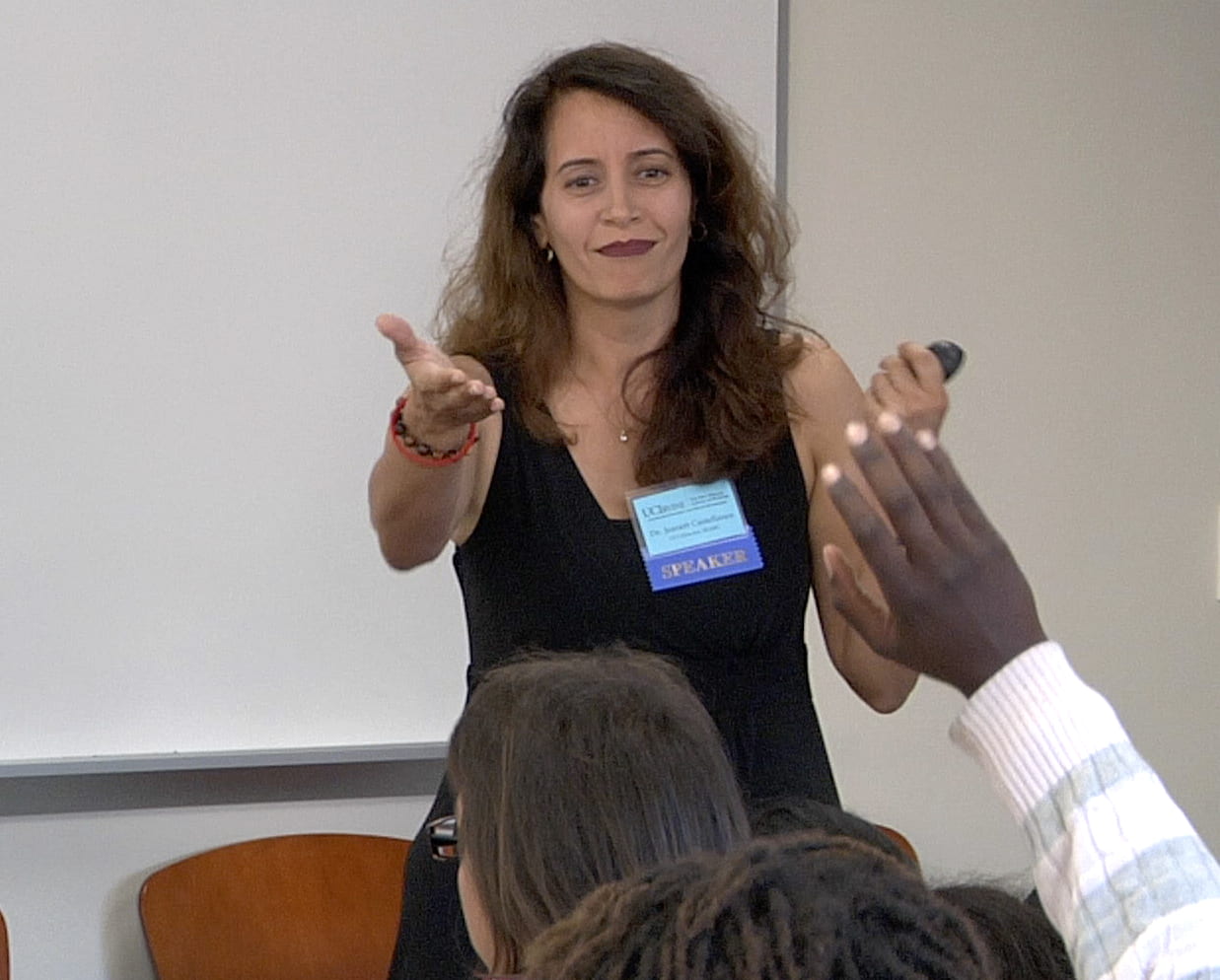Mentorship matters
A UCI professor changed Jeanett Castellanos’ life 25 years ago, and she’s been paying it forward ever since

Her list of “kids” – more than 150 Anteaters – reads like a Who’s Who at the nation’s top graduate schools, from Harvard University to The Ohio State University to UC Berkeley, while others hold high-level posts at esteemed institutions throughout the U.S. as professors, psychologists and administrators.
For Jeanett Castellanos, or “Dr. C,” as she’s known around campus, these former students aren’t just individuals who passed through her classes. They and her current charges are her mentees, her academic family, her kids – and a majority are first-generation, underrepresented college students. From the time they enter UCI until they leave, she commits years of her time to developing them as young professionals vested in their communities. And when they graduate, they take with them an edict from the social sciences lecturer: Pay it forward.
It’s a lesson Castellanos learned more than 25 years ago from her own mentor, Joseph White, UCI professor emeritus of psychology, and she’s been putting it into practice ever since.
“Good mentorship fosters purpose, public service and social change. My mentees are taught the importance of community and social responsibility – the role of giving back,” she says. “I connect the degree to their role in the community, and consequently, the degree is viewed with greater value. Specifically, it’s not simply a diploma that will guarantee extra money and social mobility (which are important) but a degree that leads to a meaningful career path that will facilitate social change and enable valuable contributions to society.”
Castellanos grew up in Southeast Los Angeles. The only child of Cuban refugees, she was raised to value education, something neither her mother nor her father had had a chance to pursue. She was the first in the family to complete high school, and when she was accepted at UCI, her parents were ecstatic. Once there, Castellanos found herself drawn to psychology, and when a friend introduced her to White – the renowned “godfather of black psychology” – her path was clear.
“He took time to work with me and helped me understand that a bachelor’s degree was only the beginning,” she says. “At that point, I didn’t really know there was anything beyond an undergraduate degree.” Castellanos graduated from UCI with bachelor’s degrees – and honors – in psychology and sociology. But when she was admitted into Washington State University’s doctoral program in education, she was a bit apprehensive about leaving home.
“Dr. White assured me it was only a pit stop and that I’d be coming back home to UCI,” she recalls. “He made it clear that a Ph.D. would open many doors. And when they did, my responsibility – in turn – was to help and mentor other students along the way.”
White was right. Doctorate and master’s in hand, Castellanos returned to UCI in 1998 to work for the dean of students and Center for Educational Partnerships. The following year, she joined the School of Social Sciences as a lecturer and director of the Social Sciences Academic Resource Center. And in these roles, she found her calling.
“Mentorship goes beyond academic guidance; it’s about personal connection and empowerment,” Castellanos says. “It’s about being invested in the students and their development. It’s fostering a space for them to grow as individuals and scholars.”
UCI is a perfect place to put that concept into practice. The campus has earned top rankings on multiple scales for fostering diversity while providing a high-value education at a relatively low cost. It was recently named a Hispanic-serving institution for 2017-18, meaning that fully one-quarter of undergraduates identify as Latino and that half of all students receive financial aid. And The New York Times’ College Access Index found UCI to be the No. 1 university doing the most for the American dream because of its commitment to upward mobility.
Castellanos – who currently oversees the social policy & public service major and the Social Science Honors Program – has been critical to the campus’s success in creating this environment for students.
“Being one of Dr. C’s kids means that you’re part of an academic family that will provide you with strong support and challenge you to reach your full potential,” says Marlen Kanagui-Munoz, a 2007 UCI graduate who earned a Ph.D. at the University of Missouri. “It means that you are expected to engage in scholarly research that is culturally competent, socially conscious, methodologically rigorous and ethical. It means that you’ll be prepared to be a competitive applicant for admission into top-ranking graduate programs in education and the social sciences at a national level. Finally, it means you are willing to pass on the gift of mentorship to those who need it wherever your career may take you.”
Over her 19-year career at UCI, Castellanos has been recognized several times for her service beyond the classroom. Most recently, she received the 2017-18 Academic Senate Distinguished Faculty Award for Mentorship. She sees it as proof that UCI highly values student development and success, particularly among first-generation and underrepresented groups.
“At its core, mentorship promotes a sense of personal worth, empowerment, community, belonging and academic family,” Castellanos says. “I’m excited to be part of a system that values and fosters this student-centered approach.”